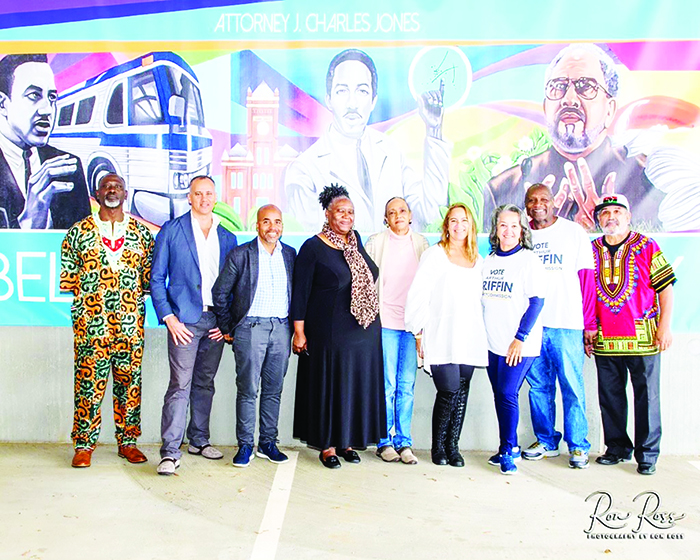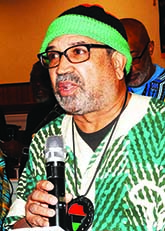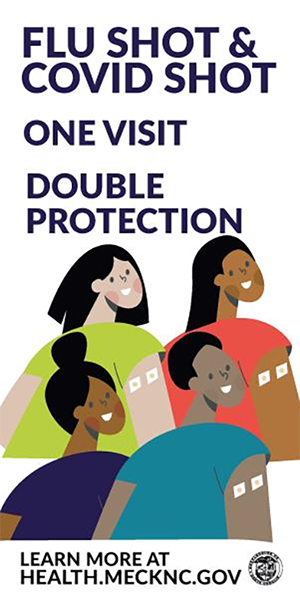
Habari Gani: A Focus on Recent Events - Vol 43

Photo By Ron Ross
By Makheru Bradley
November 13, 2022 10:28PM

Celebrating the life and legacy of J. Charles Jones
On November 5, an event organized by Sister J'Tanya Adams, the Founder and Executive Director of the Historic West End Partners, and Brother Reggie Singleton, the Founder and Executive Director of The Males Place, paid tribute to Charlotte’s most renown civil rights activist, our Esteemed Ancestor, Joseph Charles Jones. I was honored to be the keynote speaker for that event, which was attended by Brother Jones wife and children, and other family members including Arthur and Alicia Elston Griffin. The history of J. Charles Jones is well known, so there is no need to retell that whole story here. However, I think there are many interesting nuggets which are worth recounting.
His paternal grandparents were born during Chattel Slavery. They produced nine children who became college graduates. The four males graduated from Johnson C. Smith University (JCSU), and the five females graduated from Barber-Scotia College. Inspired by all of that academic achievement, a very young Charles Jones concluded he had to do something.
Charles graduated from JCSU in 1958 after serving as the student body president. His activism in national student organizations gave him the opportunity to travel to revolutionary Cuba in 1959, and to Europe where he debated Paul Robeson, Jr. When Charles heard about the Greensboro Four, and February 1, 1960 sit-in, he knew that the moment he had been waiting for was now. Eight days later, Charles would help to organize and lead sit-in protests in Charlotte. Those protests ignited a wave of student/youth led activism against American Apartheid, which resulted in the founding of the Student Nonviolent Coordinating Committee (SNCC) in April 1960. Charles Jones was a founding member of SNCC.
His work with SNCC would send him to Rock Hill, SC to participate in the “Jail No Bail” campaign and a sentence of 30 days on the prison labor chain gang. In 1961, Charles joined the Freedom Rides challenge to segregation in interstate transportation, resulting in arrests in Alabama and Mississippi. When SNCC decided, upon the advice of our Esteemed Ancestor Ella Jo Baker that it should have a dual focus— voter registration and direct action, Charles Jones became the head of the voter registration wing, and Diane Nash the head of the direct action wing. Charles’ voter registration duties carried him into southwest Mississippi to work with the legendary Bob Moses, and to Albany, GA with the recently transitioned Rev. Charles Sherrod.
Charles helped to organize the 1963 March on Washington, and while pursuing a law degree from Howard University (1966), he organized a group that demand open housing in Washington, DC. More than a civil rights activist, Charles was a humanitarian, an early environmentalist, and an economic developer. He was always proud of the cultural and ethnic diversity of his Smallwood neighborhood. We wonder what he would think today about the gentrification of Smallwood—Black people becoming refugees in their own communities.
What I did not know until I researched deeper into his history was that J. Charles Jones was also an actor, playing a minister in the movie “Gospel Hill,” which starred, Giancarlo Esposito, Angela Bassett, Danny Glover, Julia Stiles, and Samuel L. Jackson.
“We ain’t where we going, but thank God, we ain’t where we been” – Charles Jones grandmother
One of the issues I raised during the speech is, why did Charles Jones and the Blacknificent Activist Generation (1925-1950) have to fight in the 1960s for laws which had already been established during Reconstruction (1865-1877). The Reconstruction laws were undermined and nullified by the so-called “Redeemers,” who lost the Civil War, but eventually won through terror and violence, the aftermath. And, since I’m writing this article on November 8—Election Day, given the current assault on voting rights, we see today’s generations being forced to wage the same fight that Charles Jones and his comrades waged 60 years ago. It's a fight that future generations will likely face if we can't break this continuous loop of moving from oppression to reforms, to oppression. That is, from the brutal oppression of Chattel Slavery to the reforms of Reconstruction, then from the oppression of American Apartheid to the reforms of Civil Rights, and now to what Professor Michelle Alexander calls the New Jim Crow. Myopic leadership calls for more reforms—doing the same thing, expecting different results.
There are five critical areas of power: Economics, Education, Culture, Communications, and Politics. Rather than a balanced approach to power, since the passage of the Voting Rights Act in 1965 Afrikan Americans have overwhelming focused their efforts on electoral politics. We didn’t vote to get the right to vote. The mass movement of the 1960s influenced public policy, and with only six Afrikan Americans in the 89th Congress (1965-67), the Voting Rights Act was passed. We’ve obviously lost our way. The capacity to influence public policy is the most critical aspect of electoral politics.
As the United States approaches an era that could be a recapitulation of the overthrow of Reconstruction, or a Civil War, the Afrikan American body politic really needs a strategic investment of its social capital across all five areas of power, to first survive the coming turbulence, then plan for a future—where are we going, as free, proud, and productive people.
For more from the author, follow Afrikan Liberation Media.


